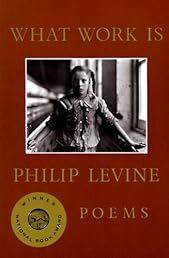
|
What Work Is: Poems
|
||||||||||||||||||||||||||
Buying Choices |
| 52 new from $7.51 |
| 48 used from $6.39 |
| 1 collectible from $99.99 |
(as of 2015-02-16 20:00:33 PST)
Description
Winner of the National Book Award in 1991“This collection amounts to a hymn of praise for all the workers of America. These proletarian heroes, with names like Lonnie, Loo, Sweet Pea, and Packy, work the furnaces, forges, slag heaps, assembly lines, and loading docks at places with unglamorous names like Brass Craft or Feinberg and Breslin’s First-Rate Plumbing and Plating. Only Studs Terkel’s Working approaches the pathos and beauty of this book. But Levine’s characters are also significant for their inner lives, not merely their jobs. They are unusually artistic, living ‘at the borders of dreams.’ One reads The Tempest ‘slowly to himself’; another ponders a diagonal chalk line drawn by his teacher to suggest a triangle, the roof of a barn, or the mysterious separation of ‘the dark from the dark.’ What Work Is ranks as a major work by a major poet . . . very accessible and utterly American in tone and language.”
—Daniel L. Guillory, Library Journal
| Check All Offers | Add to WishList | Customer Reviews |
Editoral Review
If there is such a thing as a working man's poet, then Philip Levine is it. Born into a blue-collar family in Detroit, Levine grew up amidst the steel mills and auto factories of Motor City. Laboring in the plants radicalized both Levine's politics and his art; in early works such as On the Edge and Not This Pig, he explored the gritty despair of urban working-class life, a reality that has continued to run through his later poetry as well. In his 1991 National Book Award-winning What Work Is, Levine revisits the scenes of his youth--only now the factories are shut down, the towns that depended on them devastated. In the title poem, Levine conveys a multitude of meaning in the single image of men standing in line waiting for work:the sad refusal to give in toFactory workers aren't the only subjects here, however; in "Among Children" (an American response to Yeats's "Among School Children") Levine contemplates "the children of Flint, their fathers / work at the spark plug factory or truck / bottled water in 5 gallon sea-blue jugs / to the widows of the suburbs." For these children, he contends, the Book of Job would be the most appropriate reading.
rain, to the hours wasted waiting,
to the knowledge that somewhere ahead
a man is waiting who will say, "No,
we're not hiring today," for any
reason he wants.
What work is, Levine tells us, is the accretion of a lifetime of experiences, compromises, and disappointments. It is drinking gin for the first time at 14, a premature leap into manhood; it is that first job with its double-edged promise of a "new life of working and earning," and later the unrealized dreams of escaping that life. Levine's poems move back and forth in time, touch on issues of race, religion, education--even gardening--and leave the reader with a moving portrait of working-class life from the 1940s to the present day. --Alix Wilber
Book Details | ||||
| Author: Philip Levine | Publisher: Alfred A. Knopf | Binding: Paperback | Language: English | Pages: 77 |
Similar Books |
| The Simple Truth: Poems |
| New Selected Poems |
| Last Night in Montreal |
| The Mercy: Poems |
| Sweet Will |
Comments |
Become a fan of Book Presence on Facebook for the inside scoop on latest and most exclusive books.





